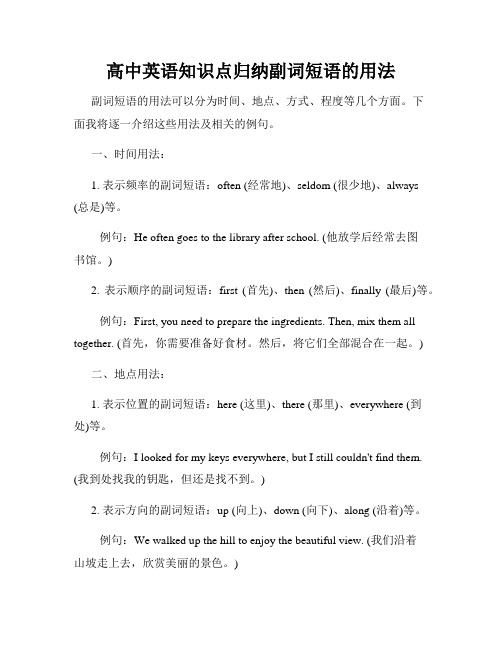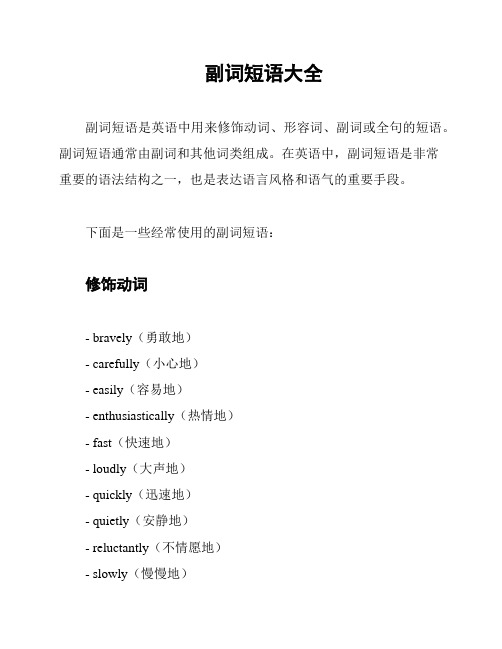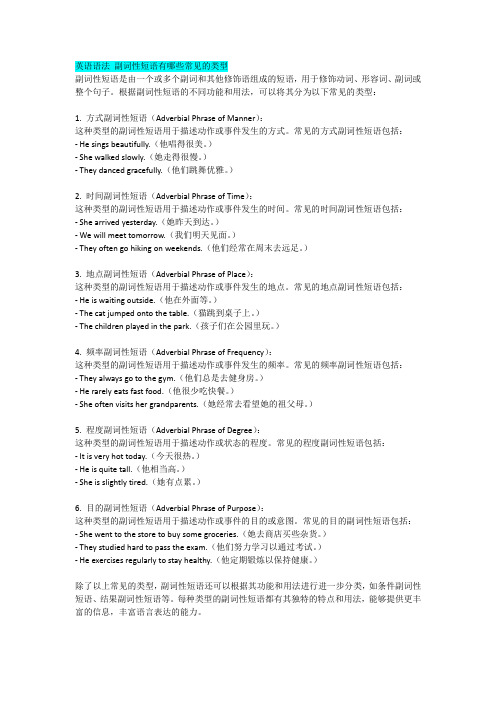英语副词短语
高中英语知识点归纳副词短语的用法

高中英语知识点归纳副词短语的用法副词短语的用法可以分为时间、地点、方式、程度等几个方面。
下面我将逐一介绍这些用法及相关的例句。
一、时间用法:1. 表示频率的副词短语:often (经常地)、seldom (很少地)、always (总是)等。
例句:He often goes to the library after school. (他放学后经常去图书馆。
)2. 表示顺序的副词短语:first (首先)、then (然后)、finally (最后)等。
例句:First, you need to prepare the ingredients. Then, mix them all together. (首先,你需要准备好食材。
然后,将它们全部混合在一起。
)二、地点用法:1. 表示位置的副词短语:here (这里)、there (那里)、everywhere (到处)等。
例句:I looked for my keys everywhere, but I still couldn't find them. (我到处找我的钥匙,但还是找不到。
)2. 表示方向的副词短语:up (向上)、down (向下)、along (沿着)等。
例句:We walked up the hill to enjoy the beautiful view. (我们沿着山坡走上去,欣赏美丽的景色。
)三、方式用法:1. 表示方式的副词短语:carefully (小心地)、quickly (快速地)、quietly (安静地)等。
例句:She spoke quietly so as not to wake the baby. (她小声说话,以免把孩子吵醒。
)2. 表示状态的副词短语:happily (快乐地)、sadly (悲伤地)、nervously (紧张地)等。
例句:The children jumped happily when they heard the good news. (孩子们在听到好消息时高兴地跳了起来。
副词短语大全

副词短语大全副词短语是英语中用来修饰动词、形容词、副词或全句的短语。
副词短语通常由副词和其他词类组成。
在英语中,副词短语是非常重要的语法结构之一,也是表达语言风格和语气的重要手段。
下面是一些经常使用的副词短语:修饰动词- bravely(勇敢地)- carefully(小心地)- easily(容易地)- enthusiastically(热情地)- fast(快速地)- loudly(大声地)- quickly(迅速地)- quietly(安静地)- reluctantly(不情愿地)- slowly(慢慢地)- softly(柔和地)- steadily(稳定地)- suddenly(突然地)- tirelessly(不知疲倦地)- uncertainly(不确定地)- urgently(紧急地)- willingly(乐意地)- wisely(明智地)- yearly(每年地)修饰形容词- amazingly(令人惊奇地)- angrily(生气地)- anxiously(焦急地)- beautifully(美丽地)- bitterly(苦涩地)- blindly(盲目地)- brightly(明亮地)- carelessly(粗心地)- cautiously(小心地)- cheerfully(快乐地)- clearly(清晰地)- closely(密切地)- coldly(冷酷地)- confidently(自信地)- correctly(正确地)- courageously(勇敢地)- crazily(疯狂地)- cruelly(残酷地)- deeply(深深地)- deliberately(故意地)- desperately(绝望地)- differently(不同地)- dimly(昏暗地)- dully(沉闷地)- easily(容易地)- elegantly(优美地)- enthusiastically(热情地)- entirely(完全地)- equally(相等地)- eventually(最终)- exactly(确切地)- excitedly(兴奋地)- extremely(极其)- fairly(公正地)- faithfully(忠实地)- famously(有名地)- far(远地)- fast(快速地)- fiercely(猛烈地)- foolishly(愚蠢地)- formally(正式地)- frankly(坦率地)- freely(自由地)- frantically(疯狂地)- fully(充分地)- furiously(狂怒地)- generally(通常地)- gently(温柔地)- gladly(乐意地)- gracefully(优雅地)- gratefully(感激地)- greatly(非常地)- hard(困难地)- hardly(几乎不)- harshly(苛刻地)- heavily(沉重地)- heroically(英雄般地)- highly(高度地)- honestly(诚实地)- hopelessly(无望地)- horribly(可怕地)- hurriedly(匆忙地)- immediately(立即)- impatiently(不耐烦地)- incredibly(难以置信地)- indifferently(冷淡地)- innocently(无辜地)- inquisitively(好奇地)- intensely(强烈地)- ironically(讽刺地)- joyfully(充满喜悦地)- justly(公正地)- kindly(友好地)- largely(大量地)- lazily(懒散地)- lightly(轻轻地)- likely(可能)- limply(柔软地)- lively(活泼地)- longingly(渴望地)- loosely(松散地)- lovingly(充满爱意地)- loudly(大声地)- madly(发疯地)- mainly(主要地)- meaningfully(有意义地)- mechanically(机械地)- merely(只是)- miserably(痛苦地)- mysteriously(神秘地)- nearly(近乎)- neatly(整洁地)- nervously(紧张地)- normally(正常地)- obediently(顺从地)- obviously(显然)- occasionally(偶尔)- oddly(古怪地)- officially(官方地)- openly(公开地)- painfully(痛苦地)- partially(部分地)- particularly(特别地)- patiently(耐心地)- perfectly(完美地)- physically(身体上地)- playfully(玩味地)- politely(礼貌地)- poorly(不好地)- powerfully(强大地)- promptly(迅速地)- properly(适当地)- proudly(自豪地)- quickly(迅速地)- quietly(安静地)- rapidly(迅速地)- rarely(罕见地)- really(真的)- reasonably(合理地)- recently(最近)- recklessly(鲁莽地)- regularly(定期地)- reluctantly(不情愿地)- repeatedly(多次地)- respectfully(尊敬地)- richly(丰富地)- rightfully(合法地)- roughly(大体地)- sadly(悲伤地)- safely(安全地)- scarcely(几乎没有)- selfishly(自私地)- seriously(认真地)- severely(严重地)- shakily(摇晃地)- sharply(尖锐地)- shyly(害羞地)- silently(沉默地)- simply(简单地)- sincerely(真诚地)- smoothly(顺利地)- softly(柔和地)- solemnly(庄严地)- solidly(坚固地)- sometimes(有时)- somewhat(有点)- soon(不久)- sorely(痛苦地)- specifically(具体)- speedily(飞快地)- spiritualy(精神上地)- spitefully(恶意地)- spontaneously(自发地)- stealthily(秘密地)- sternly(严厉地)- still(静止不动地)- strictly(严格地)- strongly(强烈地)- suddenly(突然地)- suitably(适当地)- surely(肯定)- suspiciously(可疑地)- sweetly(甜美地)- swiftly(迅速地)- sympathetically(同情地)- tenderly(温柔地)- tensely(紧张地)- terribly(可怕地)- thankfully(感激地)- thoroughly(彻底地)- thoughtfully(仔细地)- tightly(紧紧地)- too(太)- totally(完全地)- touchingly(感人地)- traditionally(传统地)- truly(真正地)- truthfully(诚恳地)- ultimately(最终)- unexpectedly(意外地)- unfortunately(不幸地)- usually(通常地)- utterly(彻底地)- vaguely(含糊地)- valiantly(勇敢地)- very(非常地)- viciously(恶意地)- victoriously(胜利地)- violently(猛烈地)- vivaciously(活泼地)- voluntarily(自愿地)- warmly(热情地)- weakly(虚弱地)- wearily(疲劳地)- well(好)- wildly(狂野地)- willingly(乐意地)- wisely(明智地)- woefully(悲哀地)- wonderfully(美妙地)- wrongly(错误地)- yearly(每年地)- yesterday(昨天)- zealously(热心地)以上是一些常用的副词短语,以供参考。
中考英语之副词短语

三、重点短语及ห้องสมุดไป่ตู้块
副词短语
与时间有关
1. just now 刚才 2. right away/now 立刻;马上 3. hardly ever 几乎从不 4. so far 到目前为止;迄今为止 5. day and night 日日夜夜 6. now and then 不时,有时 7. once in a while 偶尔;有时 8. once or twice 偶尔;一两次
9. again and again 反复地 10. and so on 等等 11. as well as 和……一样 12. here and there 到处 13. not…at all 一点儿也不 14. one after another 一个接一个 15. up and down 上上下下 16. over and over again 多次;反复地
9. sooner or later 迟早 10. the other day 前几日 11. once upon a time 从前 12. the day after tomorrow 后天 13. the day before yesterday 前天
其他
1. above all 首要的是;尤其 2. after all 毕竟;终归 3. as well 也;此外 4. much too 太 5. no longer/not…any longer 不再 6. no wonder 难怪;怪不得 7. once again 再次;再度 8. over there 在那里
英语中副词的用法举例

英语中副词的用法举例副词是一类常见的词性,在英语语言中起着非常重要的作用。
它们通常被用来修饰动词、形容词、其他副词或整个句子,以增加句子的信息量和表达方式。
以下是一些常见的副词用法举例:1.修饰动词:–She quickly ran to catch the bus.–He carefully listened to the instructions.2.修饰形容词:–The puppy is very cute.–It was a remarkably beautiful sunset.3.修饰其他副词:–He spoke extremely fast.–She danced quite gracefully.4.修饰整个句子:–Fortunately, the rain stopped before theoutdoor event.–Interestingly, the results of the experiment were unexpected.5.副词短语:–She studies English twice a week.–They go on vacation every summer.6.程度副词:–He is very clever.–She is extremely talented.7.时间副词:–They arrived early for the meeting.–The train is always on time.8.地点副词:–She looked everywhere for her lost keys.–The children ran upstairs to get their toys.9.方式副词:–He speaks English fluently.–She completed the task successfully.副词在英语中有多种用法,通过灵活运用副词可以使语言更加生动、精确和有表现力。
英语常用副词短语大全

英语常用副词短语大全1. above all 首先,尤其是2. after all 毕竟3. all of a sudden 突然间4. as a matter of fact 实际上5. as usual 照常6. at first 起初7. at last 最后8. at least 至少9. at times 有时候10. by all means 一定,务必11. by far 到目前为止12. by the way 顺便说一下13. at the same time 同时14. even so 尽管如此15. for instance 例如16. from time to time 有时17. in addition 此外18. in any case 无论如何19. in brief 简言之20. in conclusion 总之21. in fact 事实上22. in other words 换句话说23. in particular 特别地24. in short 简而言之25. in the end 最终26. in the meantime 同时27. indeed 的确28. instead 代替29. just as 正如30. likewise 同样地31. meanwhile 同时32. moreover 此外33. nevertheless 尽管如此34. nonetheless 仍然35. of course 当然36. on the contrary 相反37. on the whole 总的来说38. otherwise 否则39. overall 总体而言40. particularly 特别是41. similarly 类似地42. that is 即43. therefore 因此44. thus 因此45. undoubtedly 无疑46. yet 然而。
英语语法 什么是副词短语

英语语法什么是副词短语副词短语是由副词及其修饰语组成的短语。
副词短语可以在句子中起到多种作用,如修饰动词、形容词、副词、句子等。
以下是关于副词短语的详细解释:1. 修饰动词:副词短语可以用来修饰动词,描述动作的方式、频率、强度等。
例如:- He ran quickly.(他快速地跑)- She speaks English fluently.(她流利地讲英语)- They worked hard all day.(他们一整天都努力工作)2. 修饰形容词:副词短语可以用来修饰形容词,表示程度或程度的变化。
例如:- He is extremely tall.(他非常高)- She is quite happy with the result.(她对结果感到相当满意)- The weather is fairly warm today.(今天的天气相当温暖)3. 修饰副词:副词短语可以用来修饰其他副词,表示程度或程度的变化。
例如:- She walked very slowly.(她走得非常慢)- He ran quite quickly.(他跑得相当快)- They worked extremely hard.(他们非常努力地工作)4. 修饰句子:副词短语可以用来修饰整个句子,表示说话者的态度、观点、目的等。
例如:- Hopefully, we will finish the project on time.(希望我们能按时完成这个项目)- Interestingly, she never mentioned it before.(有趣的是,她以前从未提到过这个)- Unfortunately, he couldn't attend the meeting.(不幸的是,他无法参加会议)5. 修饰介词短语:副词短语可以用来修饰介词短语,表示介词短语中的时间、地点、原因等的程度或程度的变化。
例如:- He drove through the city very quickly.(他以非常快的速度穿过了城市)- She searched for her keys everywhere but couldn't find them.(她到处找她的钥匙,但找不到)副词短语可以使句子更加具体、生动,增加描述的细节。
英语语法 副词性短语有哪些常见的类型

英语语法副词性短语有哪些常见的类型副词性短语是由一个或多个副词和其他修饰语组成的短语,用于修饰动词、形容词、副词或整个句子。
根据副词性短语的不同功能和用法,可以将其分为以下常见的类型:1. 方式副词性短语(Adverbial Phrase of Manner):这种类型的副词性短语用于描述动作或事件发生的方式。
常见的方式副词性短语包括:- He sings beautifully.(他唱得很美。
)- She walked slowly.(她走得很慢。
)- They danced gracefully.(他们跳舞优雅。
)2. 时间副词性短语(Adverbial Phrase of Time):这种类型的副词性短语用于描述动作或事件发生的时间。
常见的时间副词性短语包括:- She arrived yesterday.(她昨天到达。
)- We will meet tomorrow.(我们明天见面。
)- They often go hiking on weekends.(他们经常在周末去远足。
)3. 地点副词性短语(Adverbial Phrase of Place):这种类型的副词性短语用于描述动作或事件发生的地点。
常见的地点副词性短语包括:- He is waiting outside.(他在外面等。
)- The cat jumped onto the table.(猫跳到桌子上。
)- The children played in the park.(孩子们在公园里玩。
)4. 频率副词性短语(Adverbial Phrase of Frequency):这种类型的副词性短语用于描述动作或事件发生的频率。
常见的频率副词性短语包括:- They always go to the gym.(他们总是去健身房。
)- He rarely eats fast food.(他很少吃快餐。
)- She often visits her grandparents.(她经常去看望她的祖父母。
英语副词短语举例

英语副词短语举例英语中,副词短语是一种由副词或副词词组构成的短语结构,用来修饰动词、形容词、副词或整个句子。
副词短语在句子中起到提供更多细节和描述的作用,丰富了句子的意义。
本文将介绍一些常见的英语副词短语,并通过举例说明它们的用法和功能。
1. 形容词副词短语形容词副词短语用来修饰形容词,增强形容词的程度或范围。
以下是一些常见的形容词副词短语:- Very slowly(非常慢地):这个副词短语用来修饰动词,表示动作的缓慢程度。
例如:She walked very slowly across the room(她非常慢地走过房间)。
- Quite often(相当经常):这个副词短语用来修饰副词,表示副词所描述的动作或状态的频率。
例如:He goes to the gym quite often(他相当经常去健身房)。
- Too loud(太大声):这个副词短语用来修饰形容词,表示形容词所描述的特征过于突出或超出了合理范围。
例如:The music was too loud(音乐太大声了)。
2. 时间副词短语时间副词短语用来表示动作发生的时间,或者描述动作的持续时间。
以下是一些常见的时间副词短语:- In the morning(在早晨):这个副词短语表示动作发生的具体时间点。
例如:I usually have breakfast in the morning(我通常在早晨吃早餐)。
- For a while(一段时间):这个副词短语用来描述动作或状态的持续时间。
例如:She sat on the bench for a while(她在长椅上坐了一会儿)。
- After school(放学后):这个副词短语表示动作发生的相对时间。
例如:We always play soccer after school(我们放学后总是玩足球)。
3. 地点副词短语地点副词短语用来描述动作的地点或者行为的方向。
以下是一些常见的地点副词短语:- In the garden(在花园里):这个副词短语表示动作发生的具体地点。
- 1、下载文档前请自行甄别文档内容的完整性,平台不提供额外的编辑、内容补充、找答案等附加服务。
- 2、"仅部分预览"的文档,不可在线预览部分如存在完整性等问题,可反馈申请退款(可完整预览的文档不适用该条件!)。
- 3、如文档侵犯您的权益,请联系客服反馈,我们会尽快为您处理(人工客服工作时间:9:00-18:30)。
I’ve nearly done my homework. I’m on the last page. Sorry madam, do you know if there is a bank near here? What’s the difference?
NEARLY: almost NEAR: close
HARD: very much, needing a lot of effort HARDLY: almost NOT
I don’t like when my mother arrives late for the dinner. I haven’t seen Larissa lately. She must work a lot. What’s the difference?
She liked very much the present. 1. Mark came last night very late 2. home. A young man was injured badly 3. and was taken to the hospital. She’s lazy a little bit about doing 4. her homework. I forgot your birthday almost, but 5. fortunately my sister reminded me. We luckily had taken an umbrella 6. because it started to rain just after we left. Jack has been apparently fired. 7.
He works very hard – he’s very persistent. It’s incredibly dark. I can hardly see anything.
What’s the difference? What is the meaning of these adverbs?
LATE: not being on time. LATELY: these days, nowadays, recently.
At the end of the class we always get the homework. It took me two years, but in the end I passed my driving test. What’s the difference?
1. Time 2. Comment 3. Degree 4. Manner 5. Frequency 6. Degree 7. Time 8. Degree 9. Comment 10. Place
Correct the following sentences.
1. 2. 3. 4. 5.
6.
7.
My parents will be here in half an hour. My parents will be in half an hour here.
Describe how much something is done, or modify an adjective.
Extremely, incredibly, very, etc., are used with
adjectives and adverbs and go before them.
▪ We’re incredibly tired.
A lot and much are often used with verbs and go
after the verb or verb phrase. after verbs, e.g.,
I would never have thought you were 40.
drive.
Usually go at the end of a sentence or clause. Place adverbs usually go before time adverbs. (PLACE, TIME)
Made by Beatrix Xénia Szabó 05.05.2016
Adverb:
a word used for describing a verb (an action) –
e.g., he walks slowly, an adjective – e.g., it’s incredibly expensive, another adverb, or a whole sentence – he works very hard..
Other common comment adverbs are luckily, basically, clearly, obviously, apparently, eventually, etc.
Most other adverbs go in mid-position, e.g.,
I just need ten more minutes. I almost forgot to go to class. I’m nearly finished with my work. She didn’t even say goodbye.
Adverbs in English often consist of an adjective with „-ly” added, for example „quickly”, „mainly,” and „cheerfully.”
Describe how somebody does something. They usually go AFTER the verb or verb phrase, however, with passive verbs they usually go in mid-position (before the main verb but after an auxiliary verb).
I love all kinds of sport, but especially ThaiChi. My graduation dress was specially made for me by a dressmaker. What’s the difference?
ESPECIALLY: above all (principalmente) SPECIALLY: in a particular way or a particular purpose, only used with a participle, e.g., It’s a specially designed umbrella. (exclusivamente)
At the end: when something has finished, e.g., at the end of the class / movie etc. In the end: eventually, after a period of time or series of events or difficulties.
Which give the speaker’s opinion Usually go at the beginning of a sentence or clause.
Unfortunately, the package never arrived. Ideally, we should leave here at 10:00.
She’ll probably come in the end.
ቤተ መጻሕፍቲ ባይዱ
Before the main verb.
1. Immediately 2. Unfortunately 3. Incredibly 4. Shouted angrily 5. Normally 6. Slightly 7. Last month 8. A lot 9. Eventually 10. Here
She liked the present very much . Mark came home very late last night. A young man was badly injured and was taken to the hospital. She’s a little bit lazy about doing her homework. I almost forgot your birthday, but fortunately my sister reminded me. Luckily we had taken an umbrella because it started to rain just after we left. Apparently Jack has been fired.
He runs very fast.
The driver was seriously injured.
Go before the main verb but after the verb to be.
I hardly ever have time for breakfast. (almost never) Liam’s always late for work. Karen realized that she was never going to learn to
▪ My husband works a lot, but he doesn’t earn much.
A little/a little bit can be used before adjectives or
